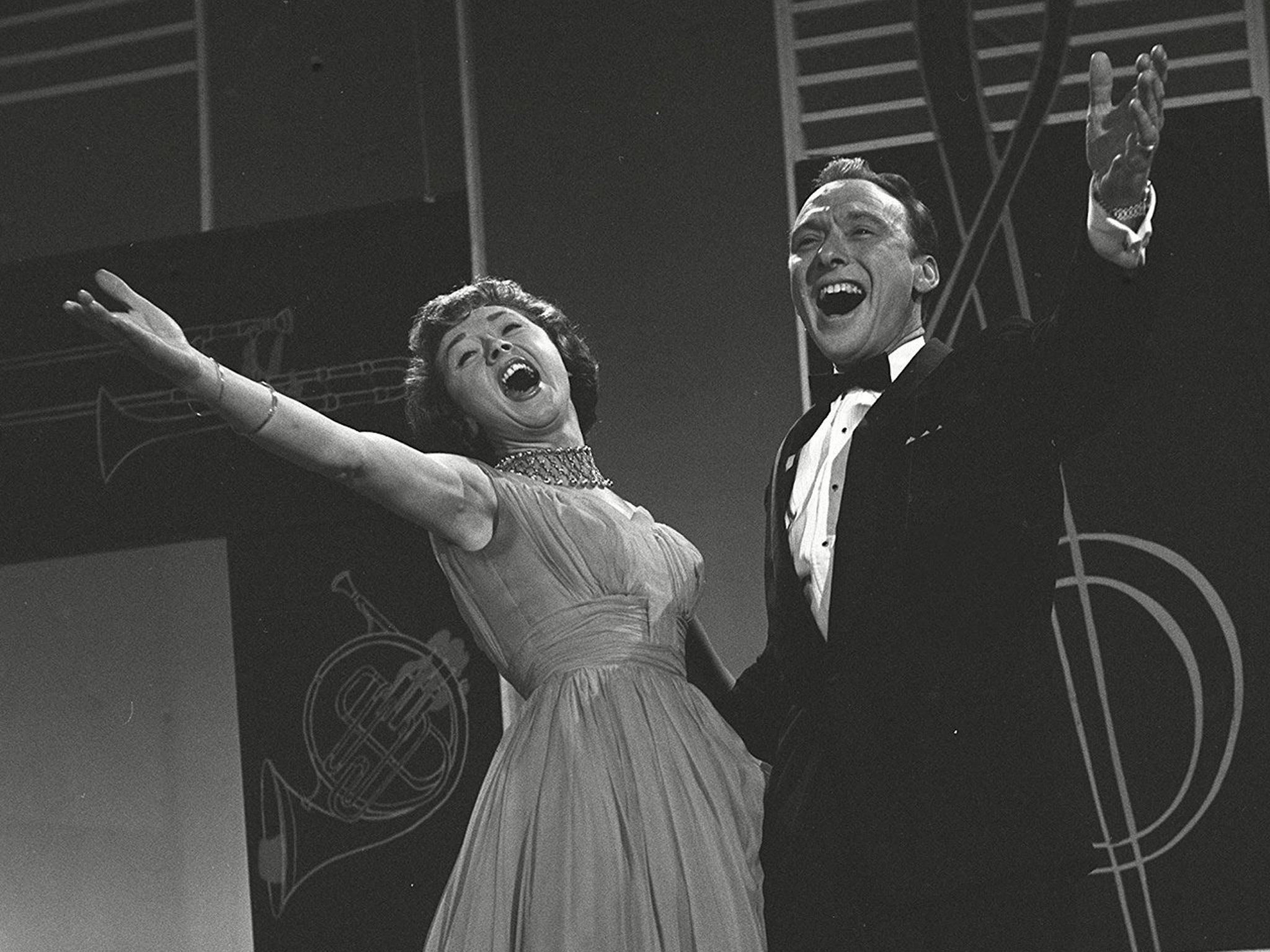Teddy Johnson: Half of husband-and-wife singing duo who came second in Eurovision Song Content in 1959
The ‘Sing Little Birdie’ performer was a successful dance band vocalist in his own right before teaming up with his wife Pearl Carr in one of the most celebrated acts of the late 1950s

Your support helps us to tell the story
From reproductive rights to climate change to Big Tech, The Independent is on the ground when the story is developing. Whether it's investigating the financials of Elon Musk's pro-Trump PAC or producing our latest documentary, 'The A Word', which shines a light on the American women fighting for reproductive rights, we know how important it is to parse out the facts from the messaging.
At such a critical moment in US history, we need reporters on the ground. Your donation allows us to keep sending journalists to speak to both sides of the story.
The Independent is trusted by Americans across the entire political spectrum. And unlike many other quality news outlets, we choose not to lock Americans out of our reporting and analysis with paywalls. We believe quality journalism should be available to everyone, paid for by those who can afford it.
Your support makes all the difference.Teddy Johnson had never heard of the Eurovision Song Contest until he and his wife Pearl Carr were selected to represent the United Kingdom in the 1959 competition with “Sing Little Birdie”. They finished runners-up in Cannes and decades later he would say with a broad smile: “We’re still singing that damn song.”
Johnson, who has died at the age of 97, would also describe the song – a catchy, jolly confection from the variety end of the pop spectrum – as “a very good friend to us down the years”. As well as running the Dutch winner close, it reached No 12 on the hit parade and confirmed Pearl and Teddy as a duo. They previously saw themselves as solo artists who happened to be Mr and Mrs.
The couple met in 1950 on a BBC TV programme called Black Magic. Johnson, who gave up his first job as an office boy to become a professional vocalist at 18, had been hired as presenter and singer. The producer proposed he perform a duet with Carr, a member of the cast. He did so reluctantly, viewing it as a one-off, then informed her he was off on tour. She told him she was coming too. They began dating and married in 1955.
The Surrey-born Johnson had other talents. In the late 1940s he had been a professional drummer and a DJ on Radio Luxembourg (a role he later reprised as a holiday stand-in for Ken Bruce on Radio 2). He did standup comedy and appeared in feature films such as the drama The Woman’s Angle (1952) and a comedy, Girls At Sea (1958), playing a crooner on each occasion.
In 1959 he and Carr went to the Television Centre as solo singers for what was called the pre-selection for Eurovision. The song contest had passed them by and they thought it was just another engagement booked by their agent. The other acts gave “Sing Little Birdie” a wide berth but Carr and Johnson immediately turned to one another and said: “That’s the one for us.”
Only when they were wished “Good luck in Cannes” did the penny drop that they were carrying British hopes. They weren’t alone in their ignorance. Soon afterwards, appearing on the children’s TV show Crackerjack, the host Eamonn Andrews congratulated them on their success in the “European Song Contest” with “Dickie Bird Sing”.
The following year they again entered pre-selection only for their song to be beaten by Teddy’s brother Bryan, who went on to emulate their second place at Eurovision. Carr and Johnson had a No 23 hit in 1961, “How Wonderful To Know”, but the youthful exuberance and irreverence of The Beatles and the long-haired groups who followed them left their gentle harmonising and wholesome appearance look dated.
They could, however, claim to have been part of the zeitgeist. In a 1970 episode of Monty Python’s Flying Circus, “Marx”, “Lenin” and “Che Guevara” took part in a “Communist Quiz”. The question was posed: “What was the 1959 Eurovision entry by Pearl Carr and Teddy Johnson?” “Sing Little Birdie?” answered “Chairman Mao”.
In the 1980s they took shows such as A Celebration of the Life and Songs of Bing Crosby and The London to Hollywood Songbook to packed seaside theatres. They appeared as Wally and Emily Whitman in a West End revival of Sondheim’s Follies for 18 months before retiring in 1990. Teddy Johnson spent his final years – with Pearl Carr, who survives him – in a rest home for retired entertainers in Twickenham.
Edward Victor Johnson, singer, actor and disc jockey, born 4 September 1920, died 6 June 2018
Join our commenting forum
Join thought-provoking conversations, follow other Independent readers and see their replies
Comments